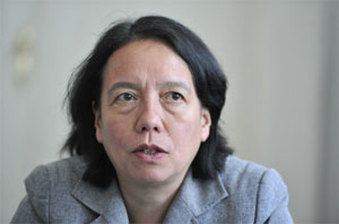|
Monika Mokre (Institute of Culture Studies and Theatre Studies and ROR-N) In the words of the French revolution, democracy is based on three fundamental values: liberty, equality, and fraternity. This well-known triad forms an aporia if we maintain that democratic rights should be universal: The acceptance of equal liberty of different individuals is based on a quasi-family relation between them[2]. In contemporary democracies, this family relation is called the nation. Nations are a construction which became necessary in order to create cohesion in large-scale societies[3]. Over the centuries, this construction has proven extraordinarily effective – it is the base of our thinking, our legal system, our rights and the denial of these rights to those who are not nationals. While European integration has somehow blurred the sharp dividing line between nationals and foreigners, it has done so only with regard to other Europeans, thus, adding a supranational limitation to the national one. Each society needs cohesion – and cohesion is based on inclusion and exclusion[4]. This holds especially true for democracy as self-government of the people as, here, the first obvious question is: Who is the people? The nation state has a clear answer to that, an answer, however, which is less and less adequate to contemporary migration societies: How democratic is a society in which more and more people are subjected to legislation which they cannot influence? One argument in favor of this existing political order maintains that, after all, there are universal rights, namely human rights and rights derived from human rights, such as refugee rights. However, these rights are not political; they cannot be enlarged or fought for by those to whom they apply. [5]And, thus, as we can see nowadays, it is, in fact very easy to take these rights away or, at least, to water them down to a degree that they are no longer recognizable. Democracy is always, at the same time, particular and universal. The definition of those who should govern themselves, i.e. of “the people” is part and parcel of democracy as an existing political system. On the other hand, the claim for continuous democratization, for enlarging democratic rights is a necessary and essential feature of democracy as an ideal, a horizon[6]. Democracy is, thus, particular in its implementation and universal in its aspirations. Democracy is a promise and a claim – and this claim has been taken up by many movements over time, the suffragette movement, the black movement, the movement for LGBT rights, movements for social rights and welfare for every citizen etc. Nowadays, movements of migrants and refugees claim their democratic rights. These movements are confronted with nationalist counter-movements. Both groups fight for “their” rights, the rights of its members and the people they (want to) represent. Still, normatively, these fights do not take place on the same terrain. Nationalist movements try to limit rights to specific groups; they defend “their rights” against others who want the same rights. Movements of migrants and refugees question the existing order and their marginalization in this order – and, in this way, they question all forms of marginalization. As every other democratization movement, also these movements are formed by those “without part”[7]. While migrants and refugees are nowadays frequently seen as a danger for democracy, out of these reflections one can come to the opposite result: Those who are excluded from democratic rights further develop democracy by their claim for inclusion. Thus, once again, in history, democracy is fought for by those excluded from democratic rights. In the words of Étienne Balibar: “So the Sans-papiers, ‘excluded’ amongst the ‘excluded’ (…), have stopped appearing as simply victims and have become actors in democratic politics. They have helped us immensely, with their resistance and their imagination, breathing life back into democracy. (…)The more these demands are understood and relayed by the citizens of our countries, the more political language and practice, today dangerously aligned with exclusive corporate and national interests, will have the chance to find the universality and inventiveness that gives them an emancipating reach for all.”[8] [1] See for a more elaborated version of the arguments in this text: Mokre, M. (2015), Solidarität als Übersetzung. Überlegungen zum Refugee Protest Camp Vienna, http://transversal.at/books/solidaritaetalsuebersetzung, pp. 73-94 [2] Cf. Derrida, J. (2005), Politics of Friendship, London-New York, p. 6 [3] Cf. Anderson, B. (1983), Imagined Communities: Reflections on the Origins and Spread of Nationalism. London and New York; Gellner, E. (1983), Nations and Nationalism. Ithaca, NY [4] Cf. Balibar, E. (1990), Die Nation-Form. Geschichte und Ideologie, in: Balibar, E./ Wallerstein, I., Rasse, Klasse, Nation. Berlin, 107-130. [5] Cf. Arendt, H. (1994), The Origins of Totalitarianism. New York, p. 292 [6] Laclau, E./ Mouffe, C. (2001), Hegemony and Socialist Strategy: Towards a Radical Democratic Politics . London/New York. [7] Rancière, J. (1995), La Mésentente: Politique et philosophie. Paris [8] Balibar, E. (1996), What we owe the Sans Papiers, http://transversal.at/transversal/0313/balibar/en
1 Comment
|
Archives
June 2022
|
No part of this publication may be reproduced, stored in a retrieval system or transmitted in any form or by any means, electronic, mechanical, photocopying, recording or otherwise, without prior permission of the copyright holder, except for the inclusion of quotations properly cited.
Published in Vienna, Austria by ROR-n.

